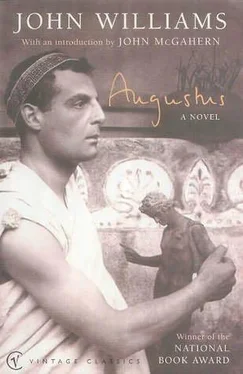John Williams - Augustus
Здесь есть возможность читать онлайн «John Williams - Augustus» весь текст электронной книги совершенно бесплатно (целиком полную версию без сокращений). В некоторых случаях можно слушать аудио, скачать через торрент в формате fb2 и присутствует краткое содержание. Жанр: Историческая проза, на английском языке. Описание произведения, (предисловие) а так же отзывы посетителей доступны на портале библиотеки ЛибКат.
- Название:Augustus
- Автор:
- Жанр:
- Год:неизвестен
- ISBN:нет данных
- Рейтинг книги:3 / 5. Голосов: 1
-
Избранное:Добавить в избранное
- Отзывы:
-
Ваша оценка:
- 60
- 1
- 2
- 3
- 4
- 5
Augustus: краткое содержание, описание и аннотация
Предлагаем к чтению аннотацию, описание, краткое содержание или предисловие (зависит от того, что написал сам автор книги «Augustus»). Если вы не нашли необходимую информацию о книге — напишите в комментариях, мы постараемся отыскать её.
Augustus — читать онлайн бесплатно полную книгу (весь текст) целиком
Ниже представлен текст книги, разбитый по страницам. Система сохранения места последней прочитанной страницы, позволяет с удобством читать онлайн бесплатно книгу «Augustus», без необходимости каждый раз заново искать на чём Вы остановились. Поставьте закладку, и сможете в любой момент перейти на страницу, на которой закончили чтение.
Интервал:
Закладка:
And yet I came to have respect and even some affection for these strange people, so unlike Romans, with whom I had to deal. The northern tribesman, his half-naked body swathed in the skins of animals he had killed with his own hands, staring at me through the smoke of a campfire, was not unlike the swarthy African who entertained me in a villa the opulence of which would dim that of many a Roman mansion; nor was the tur-baned Persian chieftain with his carefully curled beard and his curious trousers and cloak embroidered with gold and silver thread, his eyes as watchful as those of a serpent, unlike the Numidian savage chieftain who stood before me with his javelin and his shield of elephant hide, his ebon body wrapped loosely with the skin of a leopard. At one time or another I have given power to such men; I have made them kings in their lands and given them the protection of Rome. I have even made them citizens, so that the stability of their kingdoms might have the name of Rome behind them. They were barbarians; I could not trust them; and yet more often than not I found as much to admire in them as I did to detest. And knowing them made me more fully understand my own countrymen, who have often seemed to me as strange as any people who inhabit the world.
Beneath the perfume and under the coiffure of the Roman dandy who minces about his carefully tended garden in his toga of forbidden silk, there is the rude peasant who walks behind his plough and is anointed by the dust of his labor; hidden by the marble facade of the most opulent Roman mansion there is the straw-thatched hut of the farmer; and within the priest who by solemn ritual dispatches the white heifer there is the laboring father who would provide meat for his family's table and clothing against the winter's chill.
At one time, when it was necessary for me to secure the favor and gratitude of the people, I was in the habit of arranging gladiatorial games. At that time, most of the contestants were criminals whose offenses would otherwise have been punishable by death or deportation. I gave them the choice of the arena or the legal consequences of their acts, and further stipulated that the defeated fighter might plead for mercy, and that he who survived three years, no matter what his offense might have been, would be set free. I had no surprise that the criminal condemned to death or relegated to the mines might choose the arena; but it always surprised me that a criminal who had been exiled from Rome more quickly chose the arena than the relatively safe hazards of a strange country. I never enjoyed these contests, yet I forced myself to attend them, so that the people might feel that I shared in their pleasure; and their pleasure in this carnage was extraordinary to behold. It was as if they took some strange sustenance into their lives by observing another less fortunate than they relinquish his own. More than once I have had to calm the lust of the mob by sparing the life of some poor wretch who had fought bravely; and I have observed, as if upon a single face, the sullen disappointment of unconsum-mated lust. At one time I suspended those games in which one or another of the contestants was intended to lose his life, and substituted boxing matches, in which Italian was pitted against barbarian; but this did not please the mob, and others who wished to buy the admiration of the people produced spectacles of such carnage and abandon that I was forced to give up my substitution and once again be guided by the desires of my countrymen, so that I might control them.
I have seen gladiators return to their quarters from the arena, covered with sweat and dust and blood, and weep like women over some small thing-the death of a pet falcon, an unkind note from a lover, the loss of a favorite cloak. And in the stands I have seen the most respectable of matrons, her face distorted as she shouted for the blood of a hapless fighter, later in the quietness of her home care for her children and her servants with the utmost gentleness and affection.
Thus if there runs in the blood of the most worldly Roman the rustic blood of his peasant ancestor, there runs also the wild blood of the most untamed northern barbarian; and both are ill-concealed behind the facade he has erected not so much to disguise himself from another as to mask himself against his own recognition.
It occurs to me, as we drift slowly southward, that without my having to tell them to do so, the crew, since they are under no compulsion to make haste, have instinctively kept always in sight of land, though as the wind has changed we have had to go to some trouble to make corrections to follow the irregular line of the coast. There is something deep within the Italian heart that does not like the sea, a dislike that has seemed to some so intense as to be nearly abnormal. It is more than fear, and it is more than the natural propensity of the peasant to husband his land, and to avoid that which is so unlike it. Thus the eagerness of your friend Strabo to sail blithely upon unknown seas, in search of strangeness, would bewilder the ordinary Roman, who ventures beyond the sight of land only upon the occasion of such a necessity as war. And yet under Marcus Agrippa the Roman navy has become the most powerful in the history of the world, and the battles that saved Rome from its enemies were fought upon the sea. Nevertheless, the dislike remains. It is a part of the Italian character.
It is a dislike of which the poets have been aware. You know that little poem of Horace's addressed to the ship that was bearing his friend Vergil to Athens? He advanced the conceit that the gods had separated land from land by the unimaginable depths of ocean so that the peoples in those lands might be distinct, and man in his foolhardiness launches his frail bark upon an element that ought not to be touched. And Vergil himself, in his great poem upon the founding of Rome, never speaks of the sea except in the most ominous of terms: Aeolus sends his thunder and winds upon the deep, waves are lifted so high that they obscure the stars, timbers are broken, and men see nothing. And even now, after so many years and so many readings of the poem, I am still moved nearly to tears by the thought of Palinurus, the helmsman, betrayed by the god of sleep into the depths of the ocean, where he drowns, and for whom Aeneas mourns, thinking of him as too trustful in the calm of sea and sky, lying naked on an unknown shore.
Of the many services that Maecenas performed for me, the most important seems to me now to be this: He allowed me to know the poets to whom he gave his friendship. They were among the most remarkable men I have ever known; and if the Roman, as he often did, treated them with as much disdain as he dared, it was a disdain that masked a fear perhaps not wholly unlike that feeling he had about the sea. A few years ago it became necessary for me to banish the poet Ovid from Rome because of his involvement in an intrigue that threatened to disturb the order of the state; since his part in the intrigue was more nearly mischievous and social than malevolent and political, I made the banishment as light as possible; I shall lift the banishment soon, and allow him to return from the cold north to the more temperate and pleasing climate of Rome. Yet even in his place of banishment, that half-barbaric little town of Tomis that huddles near the mouth of the Danube, he continues to write his poems. We correspond occasionally, and are on friendly enough terms; and though he misses the pleasures of Rome, he does not despair of his condition. But of the several poets that I have known, Ovid is the only one whom I could not fully trust. And yet I was fond of him, and remain so.
I could trust the poets because I was unable to give them what they wanted. An Emperor may give to an ordinary man the means to a wealth that would confound the most extraordinary taste for luxury; he may bequeath such power that few men dare to oppose it; he may confer such honor and glory upon a freedman that even a consul might feel constrained to behave toward him with some deference. Once I offered to Horace the position of my private secretary; it would have made him one of the most influential men in Rome, and, had he been even discreetly corrupt, one of the richest. He replied that, alas, the state of his health precluded his acceptance of a post fraught with such responsibilities. We both knew that the post was more nearly ceremonial than laborious, and that his health was excellent. I could not be offended; he had the little farm that Maecenas had given him, a few servants, his grape arbors, and enough income to import an excellent wine.
Читать дальшеИнтервал:
Закладка:
Похожие книги на «Augustus»
Представляем Вашему вниманию похожие книги на «Augustus» списком для выбора. Мы отобрали схожую по названию и смыслу литературу в надежде предоставить читателям больше вариантов отыскать новые, интересные, ещё непрочитанные произведения.
Обсуждение, отзывы о книге «Augustus» и просто собственные мнения читателей. Оставьте ваши комментарии, напишите, что Вы думаете о произведении, его смысле или главных героях. Укажите что конкретно понравилось, а что нет, и почему Вы так считаете.











